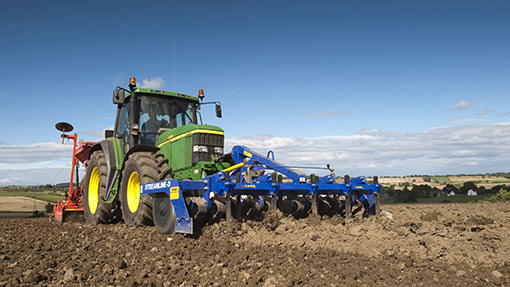Defra asked for derogation on neonics ban

Defra has been asked to grant a derogation that would enable growers to use neonicotinoid seed treatments when planting oilseed rape this autumn.
If granted, it could see 200,000ha of oilseed rape planted with Syngenta’s neonicotinoid insecticide seed treatment Cruiser – equivalent to about 27% of the UK crop.
The suspension of neonicotinoid treatments threatened to have a dramatic impact on crops, NFU combinable crops chairman Mike Hambley told a union council meeting on Tuesday (24 June).
But time was of the essence, he said.
See also: OSR growers plan for life after neonicotinoids
It was likely enough Cruiser-treated seed would be supplied only if Defra granted the derogation before the end of this week – or possibly a little later, Mr Hambley suggested.
“We are still awaiting an announcement,” he told NFU council members at Stoneleigh Park, Warwickshire.
“It rather appears that a decision is being delayed because it is becoming rather political.”
Environmental campaigners blame neonicotinoids for declining bee populations – prompting Brussels to suspend their use as a seed treatment for two years.
But Mr Hambley said neonicotinoids were a vital tool in the crop protection toolbox. Without them, 2014 could be the last big harvest in Europe, he added.
The controversy over the use of neonicotinoids within agriculture is such that it is understood the derogation request is being discussed at Cabinet level within government.
It comes as the RSPB highlighted a new report which concludes that the chemicals cause significant damage to a wide range of beneficial invertebrate species.
RSPB chief scientist David Gibbons, who was also one of the report’s authors, said: “Our assessment clearly highlights the current risks to bees and other insects from systemic pesticides.”
Although the effects on birds and other vertebrates remained unclear, they were too at risk from the toxicity of the chemicals and declining numbers of other insects on which they depended for food.
Dr Gibbons said: “For the sake of nature, farming has to find ways of producing food without putting the environment and its own future under unsustainable stress.”
The analysis, known as the Worldwide Integrated Assessment (WIA), will be published in the peer-reviewed journal Environmental Science and Pollution Research.
The RSPB is urging regulators to carefully review the evidence in the analysis – but NFU leaders have described the bird charity’s stance as alarmist.
NFU vice-president Guy Smith said: “Farmers get a little tired of the RSPB’s inability to acknowledge there has been no intensification of agriculture in the past 25 years.
“To blame recent species loss on farming is little more than a ‘fit-up’. My generation of farmers has embraced the conservation challenge and brought it into our farm management.”
For the RSPB to suggest that farmers had done nothing positive in terms of biodiversity did little to encourage producers to do more, said Mr Smith.
“Just as farmers have moved on, so to the RSPB needs to move on from their tired old habit of focusing in on any negatives they can find then blaming agriculture.
“They know there are as many success stories out there as there are concerns – the significant increase in most birds’ prey being a good case in point.”
Neonicotinoids ‘major threat’ to bees, new report concludes
Neonicotinoid and fipronil pesticides pose a “major risk” to bees, butterflies and other pollinators, a new report has concluded.
The “Worldwide Integrated Assessment” reviewed 800 studies covering the effects of these pesticides on birds, animals, soil and water as well as bees.
And it concluded that these systemic pesticides pose a major threat to a wide range of invertebrate species in soil, vegetation, aquatic and marine habitats.
The authors recommended a complete phase-out of neonicotinoid use, or at least a significant reduction.
Vanessa Amaral-Rogers of Buglife, who one of the scientists behind the report, said: “The evidence is clear: neonicotinoids are harming our pollinating insects and could be causing damage to many other species and habitats.
“Regulators must take a much more precautionary approach to pesticide authorisations.”
Paul de Zylva of Friends of the Earth, added: “The widespread use of neonicotinoid seed treatments is not compatible with sustainable farming.
“Pesticides should be used only when they are really needed, not as an ‘insurance’ against possible pest damage. We need to see a wholesale shift to more bee-friendly ways of farming.”
However, the Crop Protection Association said the new report was “not new research” and was a “selective review of existing studies which highlighted worst-case scenarios, largely produced under laboratory conditions”.
